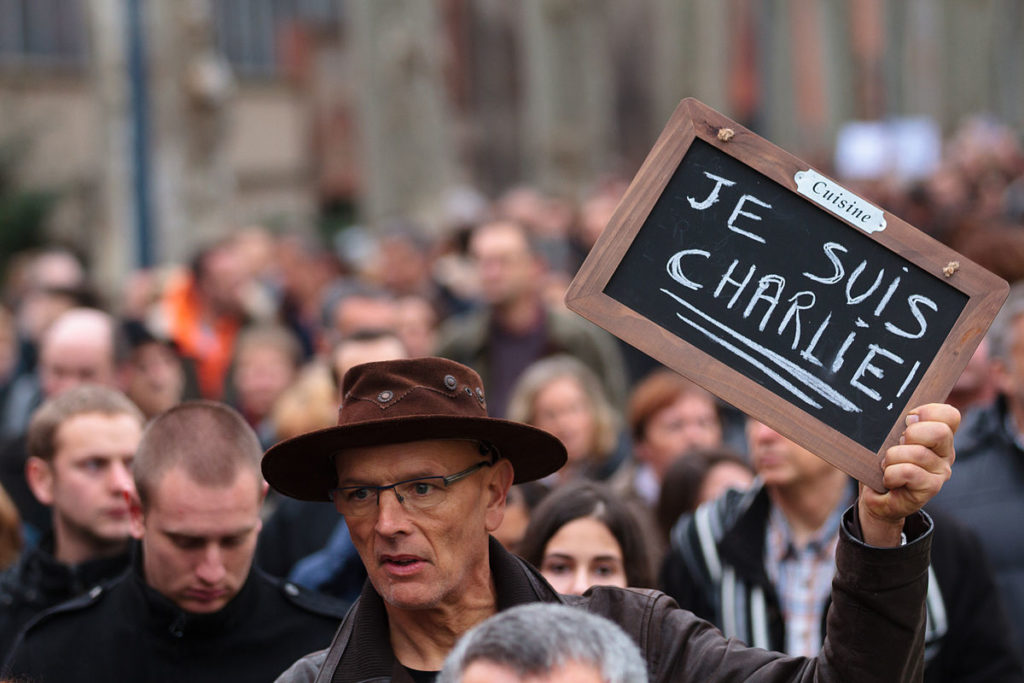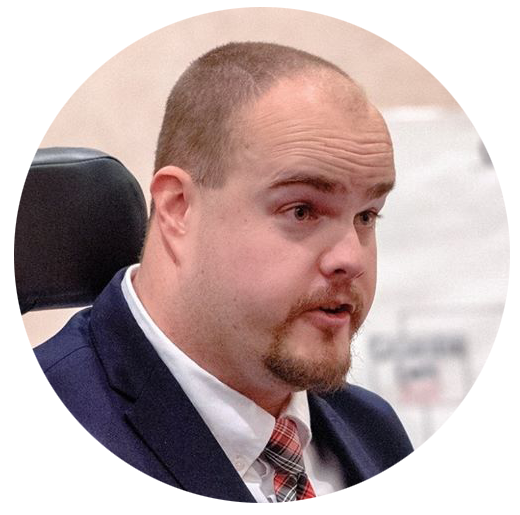
“Free Speakers, Restrained Hearers: Blasphemy’s Legal Evolution“
Matthew P. Cavedon
The most infamous terror trial in modern France began in September. Five years ago, Islamist terrorists shot nearly two dozen people at the offices of Charlie Hebdo, a satirical magazine. The publication had drawn their ire by reprinting twelve cartoons of Islam’s Prophet Muhammad that some Muslims considered blasphemous.
Blasphemy was a criminal offense in much of the West until not long ago. Its evolution in law reveals a relatively recent reversal – speakers are now free, and listeners must show restraint. While this trend is not universal, it is the logical outgrowth of free speech, religious diversity, and equality before the law.
Hostility toward blasphemy has a long history in the West. Saint John Chrysostom, a leading Christian authority in the fourth and fifth centuries, taught that if a believer encountered a blasphemer, the correct response was: “Smite him on the face; strike his mouth; sanctify your hand with the blow.” Such violence was justified because God was owed even more reverence than Roman imperial authorities, who were protected from insult. “[I]f it be necessary to punish those who blaspheme an earthly king, much more so those who insult God. It is a common crime, a public injury . . .”
While blasphemy remained forbidden, the rationale for this shifted over time. The 18th-century giant of English jurisprudence William Blackstone, like Saint John, also considered blasphemy to mainly “offend Almighty God.” But blasphemy’s being a matter of spirituality argued against, not in favor of, its criminal punishment, as criminal jurisdiction properly concerns “the mischiefs which [acts] produce in civil society” and not “breach of mere . . . duties, which man is bound to perform considered only as an individual.” Why, then, did Blackstone approve of criminalizing blasphemy? Because of its “evil example, or other pernicious effects” on society.
Early American courts occasionally punished blasphemy for these reasons. In 1811, Chancellor James Kent, a major early commentator on American law, wrote an opinion upholding a New York blasphemy conviction. The defendant had told a crowd that “Jesus Christ was a bastard, and his mother must be a whore.” Chancellor Kent noted that blasphemy “tends to corrupt the morals of the people, and to destroy good order,” and so it “affect[ed] the essential interests of civil society.” Despite mentioning the freedoms of religion and of “free and decent discussions on any religious subject,” he ultimately found the blasphemy in question “an abuse of that right.” A similar duty to speak responsibly can also be found in some early state constitutions. Take, for instance, the Georgia Constitution of 1861, which states that “while every citizen may freely speak . . . he shall be responsible for the abuse of the liberty.” (The language is unchanged to this day.)

Still, tension lurks within Chancellor Kent’s opinion between the traditional reasons for punishing blasphemy and the new American nation’s protection of equal religious liberty for all. Chancellor Kent says “that we are a christian people, and the morality of the country is deeply ingrafted upon christianity.” He elevates “Christianity, in its enlarged sense, as a religion revealed and taught in the Bible,” to a place of high solicitude. Perhaps most troublingly, he disavows any suggestion that “the religion of Mahomet or of the grand Lama . . . those impostors” – that is, Islam or Buddhism – are entitled to equal honor and protection.
This was bound to meet with challenge as the United States developed into a more religiously diverse and pluralist country. The great showdown finally came in the 1940 U.S. Supreme Court case of Cantwell v. Connecticut. The facts were very similar to those considered by Chancellor Kent. The defendant was a Jehovah’s Witness. He went door-to-door in a predominately Catholic neighborhood, playing a record for anyone who agreed to hear. It turned out to lambast Catholicism. After two hearers “were incensed by the contents . . ., and were tempted to strike” the defendant, he was arrested and convicted for a breach of the peace.
The expectation has shifted from speakers holding their tongues to listeners stopping their ears.
The U.S. Supreme Court reversed this decision based on the freedoms of religion and speech. It noted that the common law criminalized those “acts and words likely to produce violence in others.” If speech presented “clear and present danger of riot, disorder, interference with traffic . . . or other immediate threat to public safety, peace, or order,” it could still be banned. But the defendant was not being “noisy, truculent, overbearing or offensive.” While the record was so vitriolic that it “naturally would offend not only persons of [the Catholic] persuasion, but all others who respect the honestly held religious faith of their fellows,” its remarks were not specifically aimed at the hearers. Therefore, he had the right to play it.
The shift from Kent to Cantwell is profound. Earlier thinkers certainly cited extrinsic social consequences as reasons to ban blasphemy. But regardless of any imminent audience reaction, speakers were punished if they went beyond socially acceptable religious discourse. Now, in the post-Cantwell era, the law does not punish blasphemy writ large in order to uplift society. Gone is the simple waving away of fundamental rights with the talisman “abuse.” Gone is the old talk of Christianity as the American way, with other religions mere “impostors.” Now, freedom will reign, religions will be equally subject to criticism, and listening without violence will take precedence over speaking without offense. The expectation has shifted from speakers holding their tongues to listeners stopping their ears.
France’s tolerance of Charlie Hebdo reflects a similar change. Its depictions of Muhammad, and other religious figures, would have been punished had the older mentality held sway. But now, viewers are the ones expected to restrain themselves. This is a significant departure from the past. Observed French Catholic commentator Pascal-Emmanuel Gobry:
Right after the attack, André Cardinal Vingt-Trois, archbishop of Paris, sent a message of dismay and support for Charlie Hebdo’s right to mock his faith. A century ago, the cardinal’s predecessor would undoubtedly have thought that Charlie Hebdo should be shut down as a measure of public safety. And a few centuries before that, his predecessor might have put [Charlie Hebdo artists] Charb or Cabu on the rack.
This shift has not been welcomed universally. When Charlie Hebdo reran the controversial cartoons on the first day of the trial, provocatively captioned “All This, For This,” Pakistan’s foreign minister lodged a diplomatic complaint and threatened that “those responsible . . . will be taken to a court of law.” Ireland only abolished its blasphemy law in 2019, four years after a Muslim leader threatened to invoke it against any media outlet that ran the Muhammad cartoons. While condemning the Charlie Hebdo massacre, Pope Francis still echoed Saint John Chrysostom: “If [a close friend] says a swear word against my mother, he’s going to get a punch in the nose.” Even the United Nations qualifies the freedom of speech with the need to curb “advocacy of . . . religious hatred.”
Despite these opinions, the approach to blasphemy laws taken by the United States, France, and Ireland are unlikely to change. They reflect the values of civilizations that prize the freedoms of speech and religion and aspire to treat citizens equally regardless of their religious beliefs – values that have proven amenable to many religious citizens. Mr. Gobry put it succinctly in justifying his solidarity with Charlie Hebdo:
[A]s much as I am a man of Christ and a man of the church — because I am these things — I am also a man of Enlightenment liberalism. That is why I see an attack against people with whom I disagree on almost everything as an attack on my values, on what I believe in and cherish.
Meanwhile, back on this side of the Atlantic, Justice Kennedy, joined by three other U.S. Supreme Court justices, wrote in a recent opinion:
A law that can be directed against speech found offensive to some portion of the public can be turned against minority and dissenting views to the detriment of all. The First Amendment does not entrust that power to the government’s benevolence. Instead, our reliance must be on the substantial safeguards of free and open discussion in a democratic society.
Our society is simply too diverse to sustain yesterday’s censorship. It could not be applied equally or with due respect for liberty. Rather than requiring speakers to exercise restraint, we must demand it of listeners. ♦

Matthew P. Cavedon is a criminal defense attorney in Gainesville, GA. He graduated from Emory University in 2015 with a law degree and masters of theological studies.
Recommended Citation
Cavedon, Matthew P. “Free Speakers, Restrained Hearers: Blasphemy’s Legal Evolution.” Canopy Forum, October 30, 2020. https://canopyforum.org/2020/10/30/free-speakers-restrained-hearers/

